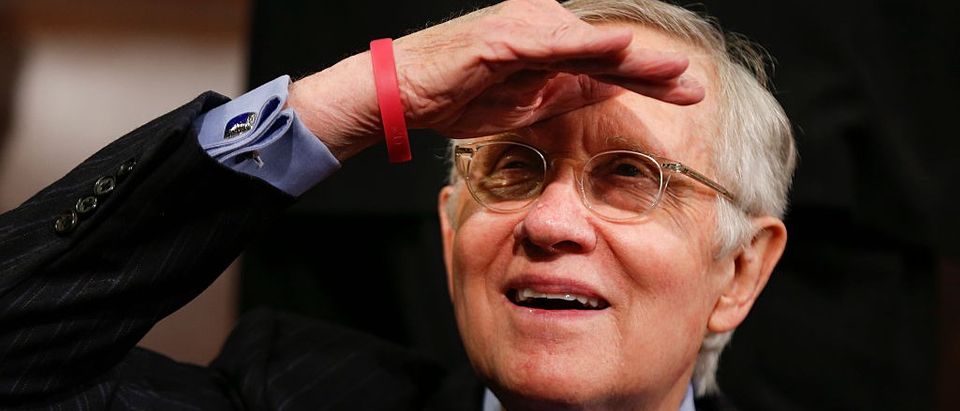Do Democratic politicians like government shutdowns? Such a question sounds preposterous given the dominant media and political narrative claiming that civic-minded Democrats work to keep vital government services open, while shutdown-loving Republican zealots sabotage the government.
This narrative is lazy, partisan, and flat-wrong. Congressional Republicans have repeatedly authored legislation to ensure that government shutdowns never happen again. Democrats have blocked these bills. If Congress cannot come to a funding agreement by this Friday’s deadline, part of the blame will rest with these Democrats who could have ensured that a shutdown is not even an option.
To explain, let’s back up for a moment. Two-thirds of all government spending (“mandatory spending”) automatically renews itself each year without even needing a Congressional vote. Only the remaining one-third of government – discretionary spending – goes through the annual appropriations process. If these appropriations are not enacted by the October 1st fiscal new year, the affected programs shut down – unless they are deemed “essential services” for public safety.
In reality, Congress has missed the appropriations deadline in 30 of the past 32 years (yes, your tax dollars at work). So they usually enact a continuing resolution to fund these discretionary programs at the previous year’s level for a few additional months while they finish the appropriations bills. The latest continuing resolution for last October’s appropriations expires on April 28th.
There have been 18 government shutdowns since 1976, rarely for more than a few days. Typically, a president or a congressional faction will hold up the continuing resolution and appropriations bills until a funding demand is met. The longest shutdown – one month – occurred around Christmas 1995 when President Clinton refused to accept a seven-year balanced budget path put forth by House Speaker Newt Gingrich and the Republican Congress. More recently, a dispute on ObamaCare funding between President Obama and Republicans led by Senator Ted Cruz (R-TX) brought a 16-day shutdown in 2013.
In nearly all instances, Americans we’re told that “anti-government” Republicans were shutting down the government over the objections of Democrats.
Then how does one explain the Democratic opposition to banning government shutdowns?
In 2013, the “End Government Shutdowns Act” was introduced by Republican Senator Rob Portman of Ohio (full-disclosure: I was his chief economist at the time). This bill would simply continue funding at the previous year’s rate until any late appropriations can be finished. Essentially, it would make continuing resolutions automatic. To keep everyone at the bargaining table, spending levels would automatically fall by one percentage point every three months until the stalemate ends.
Republicans nearly unanimously supported this proposal to ensure no more government shutdowns. Yet Democrats voted almost unanimously to defeat the proposal – and thus to continue the threat of lost government benefits, national park closures, and federal employee furloughs. These Democrats have intensified their opposition since then.
The eventual one percentage point cuts were not the issue, as Democrats never counter-offered to strike that provision. In fact, most Democrats made no argument at all before voting down the proposal. They quietly defeated it.
Why would Democrats want to keep the threat of government shutdowns alive?
Look no further than combative former Vermont Governor Howard Dean. Back in 2011, he admitted that “[f]rom a partisan point of view, I think it would be the best thing in the world to have a shutdown… If I was head of DNC, I would be quietly rooting for it. I know who’s going to get blamed. We’ve been down this road before.”
In other words, former Governor Dean says Democrats should root for government shutdowns because opinion-makers will reflexively blame the GOP.
And he’s right. Even as President Clinton was rejecting legislation to reopen the government in 1995, Republicans were blamed. The national backlash pummeled Congressional Republicans so badly that they subsequently went on a 10-year spending spree (later encouraged by a “compassionate conservative” president) just to rehabilitate their “mean-spirited” image.
Thus, the lesson for conservatives: shutdowns do not shrink government. They create an intense national backlash that leads to a Republican surrender and ensuing spending binge that dwarfs whatever small savings the government shutdown could have produced.
Democrats understand this. And rather than fight shutdowns, they bait Republicans into them.
During the 2013 shutdown, the Obama Administration was accused of maximizing the disruptions to create an anti-GOP backlash. Then-Senate Majority Leader Harry Reid (D-NV) openly admitted as much when a CNN reporter asked if he would accept a Republican offer to re-open the National Institutes of Health to help children with cancer. “Why would we want to do that?” Reid snapped back, before verbally attacking the reporter for even entertaining such a possibility. Once again, Republicans were blamed for the continued closure of the NIH and other key agencies.
Two years later, Senator Reid knew that shell-shocked Republicans would do anything to avoid the public relations hit of another government shutdown. So he threatened to block the consideration of all appropriations bills until Republicans agreed to bust the statutory spending caps. Nervous Republicans caved.
It is no mystery why Democratic politicians oppose banning government shutdowns. They have become a tool for expanding government. It is time for Congressional Democrats to be held accountable for encouraging shutdowns, and for Republican lawmakers to stop taking the bait.
Brian Riedl is a senior fellow at the Manhattan Institute. Follow him on Twitter.


